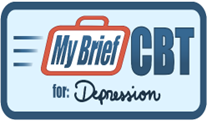Takeaway: MyBrief Cognitive Behavioral Therapy (CBT) streamlines care for Veterans with depression who are at risk for suicide. The program has trained over 80 providers across 40 facilities and 4 VISNs. Providers have delivered MyBrief CBT to over 800 Veterans. Veterans typically receive 3-4 sessions of care and show significant reductions in depressive symptoms. Resources are available for VISNs, facilities, and providers to use the MyBrief CBT program.
Depression is a serious health condition that places tremendous burdens on patients and healthcare systems and is especially prevalent among Veterans. An estimated 21 million adults had at least one major depressive episode in 2020, representing 8% of the U.S. adult population.1 According to the Centers for Disease Control and Prevention (CDC), a significant risk factor for suicide is depression.
Cognitive behavioral therapy (CBT), consisting of 12 to 16 sessions, has been shown to be an efficacious treatment for depression. Brief CBT involves 3-6 sessions of care and is also effective but compresses clinical practices to improve access and reduce treatment burden on providers and patients.
Through a series of multisite clinical trials supported by HSR&D, a team of investigators, in collaboration with clinical and operational partners, developed and tested a brief CBT approach for depression. Led by Jeffrey Cully, PhD, an investigator with HSR&D’s Center for Innovations in Quality, Effectiveness and Safety (IQuESt), the research team documented the effectiveness of brief CBT for Veterans while simultaneously developing strategies to help VA providers use the intervention in clinical settings. Outcomes of these trials found brief CBT reduced depression symptoms and suicidal ideation among Veterans in primary care and VA Community Based Outpatient Clinics (CBOCs) and provided critical insights into the need for a multifaceted provider support program.2-4
In 2019, the research team received HSR&D funding to increase the availability of brief CBT by training and supporting VA providers to deliver the program to Veterans. Marketed as MyBrief CBT for Depression, the program was introduced to mental health leaders in VISN 16 (South Central VA Healthcare) and VISN 17 (VA Heart of Texas Healthcare Network) and was rapidly adopted. Notably, the research team transitioned into the MyBrief CBT “national resource team” (NRT) to focus on partnerships, resources, and developmental opportunities to ensure providers and operational partners had support to use the program in their clinical settings.

To improve adoption and scaling, the NRT created a suite of resources and support strategies to help providers, facilities, and VISNs.5 Resources include:
MyBrief CBT is effective for use in VA clinical settings. More than 80 providers have been trained across 40+ VA facilities and 4 VISNs. Providers have engaged over 800 Veterans in care and have delivered more than 3,000 sessions of MyBrief CBT. Veterans receiving MyBrief CBT have experienced notable improvements in depressive symptoms.
The MyBrief CBT program, developed specifically for Veterans through HSR&D funding, has received robust support from clinical providers and operational partners, has increased access to psychotherapy services in four VISNs, and has been shown to be particularly effective at decreasing depression symptoms in Veterans. VISNs or facilities interested in the MyBrief CBT program can reach the NRT at VHAHOUMyBriefCBT_NRT@VA.GOV.
VISNs 8 (Sunshine Healthcare Network), 16, 17, and 19 (Rocky Mountain Network). South Central MIRECC, Rocky Mountain MIRECC, and VA’s Office of Rural Health (ORH).